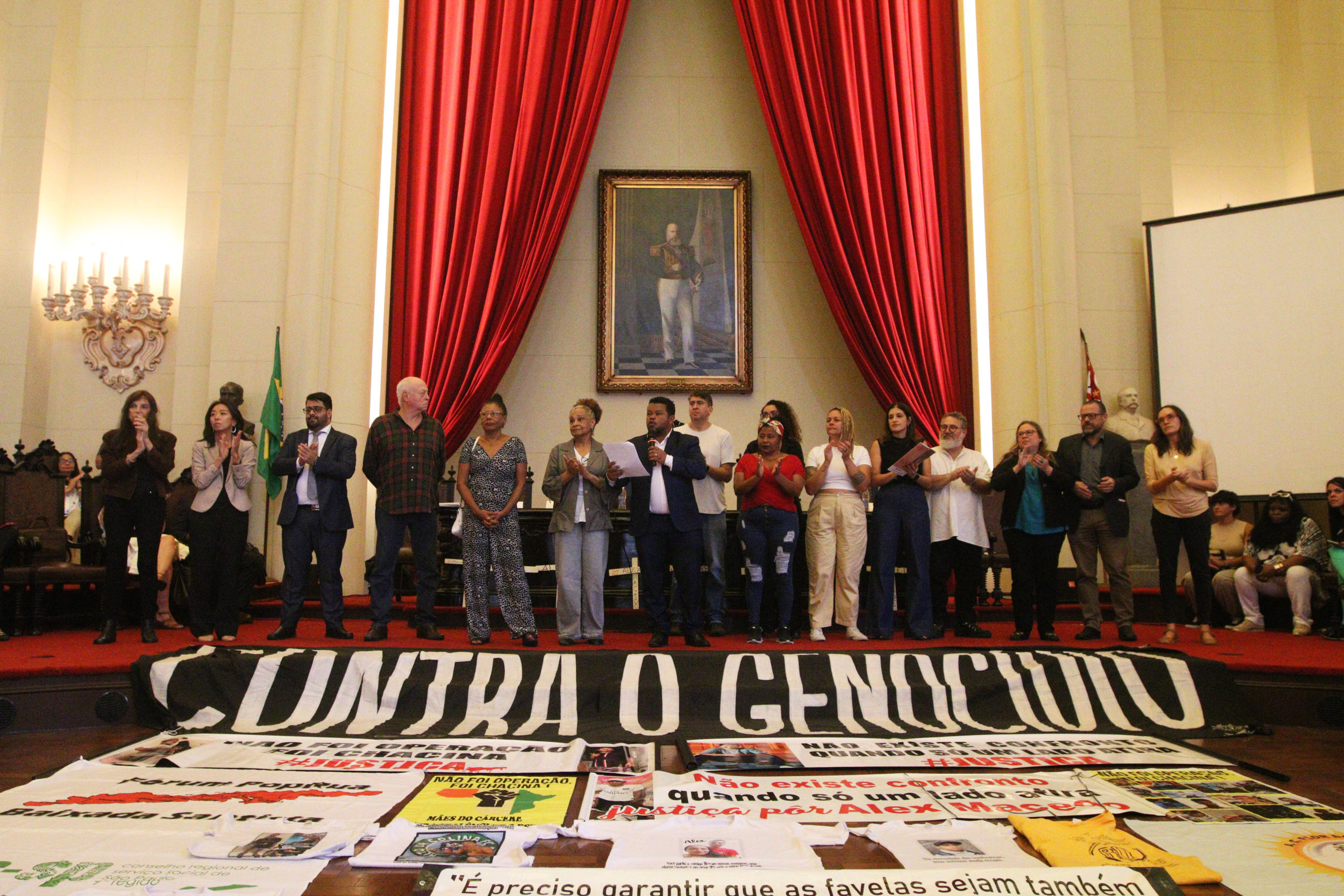Operation Shield: report reveals serious human rights violations in the Baixada Santista
Extrajudicial killings, procedural misconduct and obstruction of body cameras are examples of illegalities that occurred during a police operation carried out by the São Paulo state government
 São Paulo (SP), 25/03/2024 - Audiência Pública Operação Escudo/Verão, organizada pela Ouvidoria de Polícia de São Paulo e Ouvidoria Nacional dos Direitos Humanos, na Faculdade de Direito da Universidade de São Paulo - USP. Foto: Rovena Rosa/Agência Brasil
São Paulo (SP), 25/03/2024 - Audiência Pública Operação Escudo/Verão, organizada pela Ouvidoria de Polícia de São Paulo e Ouvidoria Nacional dos Direitos Humanos, na Faculdade de Direito da Universidade de São Paulo - USP. Foto: Rovena Rosa/Agência Brasil
A collaborative report put together by the São Paulo Police Ombudsman, civil society organizations and movements for the defence of human rights, outlines a series of violations during the second phase of Operation Shield in the Baixada Santista. This operation, now called Operation Summer by the São Paulo government, has been marked by extrajudicial killings, torture and the obstruction of justice.
According to the document, between early February, when two police officers were killed, and March 18 of this year, at least 48 people died in police interventions that were part of the operation. When added to the deaths from the first phase, the total number of victims is 76 people, just in the Baixada Santista region.
On Monday (25), families of individuals killed by the operation and leaders from the Baixada Santista region held a public hearing at the Law School of USP, where they presented the report and delivered it to representatives of the Public Prosecutor’s Office, the Public Defender’s Office, and the federal government. Cláudio Silva, the police ombudsman of São Paulo, also attended the hearing.
Rights violations
The survey produced by the Ombudsman’s Office and organizations outlines eight cases involving 12 fatalities and two injured individuals, all victims of police violence in Santos, São Vicente, and Cubatão. According to the document, 11 of the victims were black men, including one black person with a disability. The cases that are documented include extrajudicial killings, alteration of crime scenes, lack of adequate medical assistance, obstruction of forensic examination, disproportionate use of lethal force, threats to witnesses, violent approaches and torture, among other violations.
The document was prepared based on a mission that took place in early March in the cities of São Vicente and Cubatão, led by the Ombudsman’s Office of the State of São Paulo.
The report is signed by the Brazilian Forum on Public Security, Sou da Paz Institute, Vladimir Herzog Institute, Network for Protection and Resistance Against Genocide, Centre for Human Rights and Popular Education (CDHEP), Arns Commission, POP Rua Forum, Conectas, Torture Never Again Group, State Front for Decarceration. In addition to these organizations, the Institutional Violence Confrontation Unit of the Brazilian Bar Association and the Human Rights Commission of the São Paulo Lawyers’ Union (Sasp) also participated.
Even in the face of serious accusations and evidence, authorities of the São Paulo state government have downplayed the situation. The governor himself, Tarcisio de Freitas, dismissed the allegations presented in February to the United Nations by Conectas and the Arns Commission about illegalities during the operation.
See here the recommendations in the report:
1- The first of them is the end of the Shield and Summer operations, as it is understood that there is a lack of intelligence in the management of actions in the Baixada Santista.
2- The mandatory use of body cameras by everyone involved in operations like the so-called Operation Shield/Summer .
3- Internal control: the document highlights the importance of ensuring that all cases of police intervention resulting in death are monitored by the Military Police Internal Affairs Department.
4- Mental health: the expansion of access to psychological support for military police officers.
5- Autonomous investigation: among other points, ensuring that all cases of deaths resulting from police intervention within the scope of Operation Shield/Summer are conducted by the Department of Homicides and Personal Protection (DHPP) and ensuring that the IML (Institute of Legal Medicine) is called to remove bodies, preserving the scene for forensic work.
6- Witness protection: preventing threats and retaliation against relatives of victims and witnesses.
7- Reparation: acknowledgment by the state government of human rights violations, as well as financial compensation for the damages caused.


